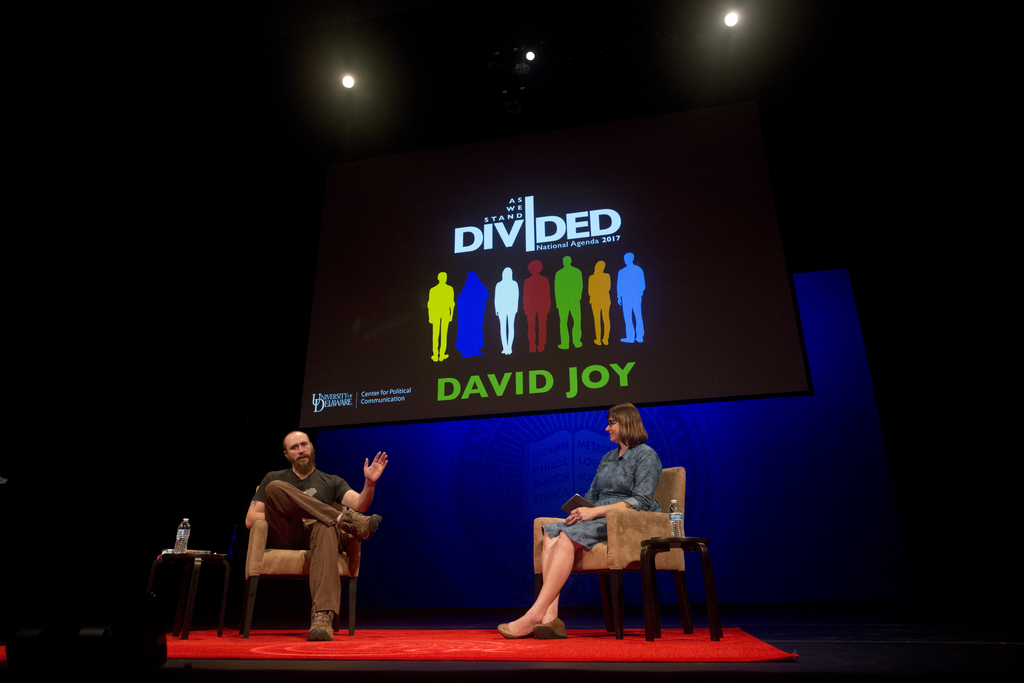Finding our similarities
Author David Joy examines geographical divides among people, places, and America
Article by the Center for Political Communication, September 22, 2017.
Event Review: Watch the video. Listen to the podcast. Read the transcript. Media Review: Read about it in UDaily and The Review. Watch the STN49 candid interview.
The “As We Stand | Divided” speaker series welcomed its second speaker, David Joy, to the Mitchell Hall Theater last Wednesday evening. The North Carolina native writes about life in Appalachia, focusing on struggles of the people with poverty, crime, and drug abuse. He created an intimate atmosphere with the audience, reading excerpts of One Place Misunderstood, and a section of his most recently published book, The Weight of This World. On his stories of Appalachia, Joy said, “I go to the darkest places imaginable and find humanity.”
Joy is the author of Where All Light Tends To Go as well as the novels The Weight Of This World and the upcoming The Line That Held Us. He is also the author of the memoir Growing Gills: A Fly Fisherman’s Journey, which was a finalist for the Reed Environmental Writing Award and the Ragan Old North State Award.
UD’s Center for Political Communication hosts its annual National Agenda speaker series, which is free and open to the community, to promote civil and constructive dialogue about current issues affecting today’s political landscape in America. This year’s series explores the many divides that exist in the United States, including gender, geographic, religious, partisan, and cultural. David Joy mentioned on stage that “an event like this is a prime example in encouraging meaningful dialogue.”

“To regionalize is so often to marginalize. Instead, see the humanity and question that, rather than where they come from. We all keep looking for differences, but now more than ever I think we need to start seeing our similarities.”
“I write from a very personal perspective about what divides us and what brings us together, ” said Joy. He spoke about the tendency to stereotype people in other parts of the country, and to break that habit American must fight against stereotypes that promote “ignorance, lack of personal responsibility, and violence.”
Appalachia is a region that scales from Mississippi to New York and many tend to stereotype its culture, environment, and people. In his essay, David Joy recalls a memory that speaks to this issue. He said, “I once had a media escort wheeling me around in a Mercedes through some noisy city who asked what people where I’m from thought of my work before stuttering, ‘Or can they read?’ I ate it and let that feeling roll around in my stomach and just said, ‘Yes, we can read.’”
“To regionalize is so often to marginalize. Instead, see the humanity and question that, rather than where they come from. We all keep looking for differences, but now more than ever I think we need to start seeing our similarities.” To break down barriers among polarized groups, people must take time to understand other viewpoints, said Joy. “Encourage meaningful dialogue. It takes bravery and empathy to listen to other perspectives.”
With nationally known speakers, the National Agenda program encourages students, staff, faculty, and community members to join the conversation. CPC Associate Director Dr. Lindsay Hoffman moderates the series. She also teaches Communication and Political Science. National Agenda is made possible by generous support from the University of Delaware’s Office of the Provost. To view previous National Agenda presentations, please visit the University of Delaware National Agenda YouTube Channel. A full schedule and more details about National Agenda are available at the website.
